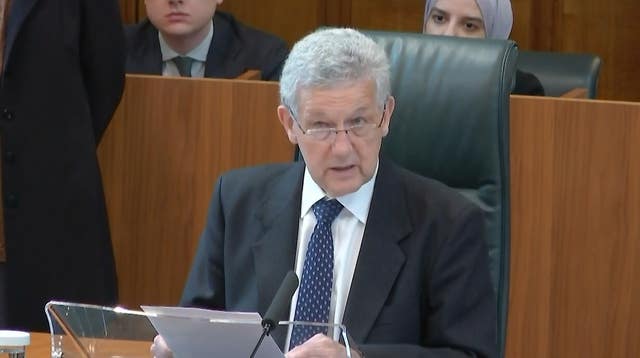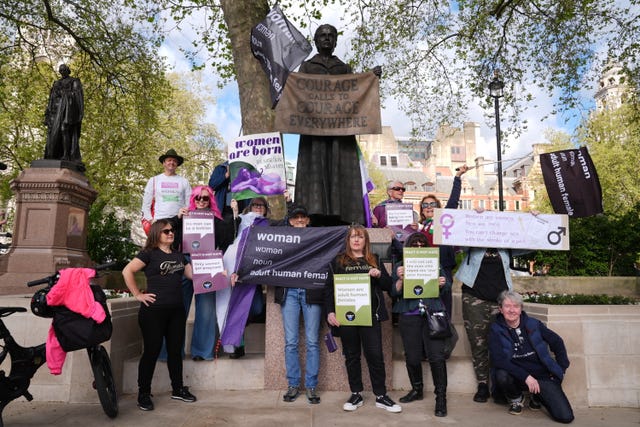‘Woman’ in equality law refers to biological women, Supreme Court rules
Justices at the UK’s highest court considered a case brought by campaigners For Women Scotland.

The terms “woman” and “sex” in the Equality Act refer to a biological woman and biological sex, the Supreme Court has ruled.
Campaign group For Women Scotland (FWS) brought a series of challenges – including to the UK’s highest court – over the definition of “woman” in Scottish legislation mandating 50% female representation on public boards.
The dispute centres on whether someone with a gender recognition certificate (GRC) recognising their gender as female should be treated as a woman under the UK 2010 Equality Act.
FWS has previously said not tying the definition of sex to its “ordinary meaning” could have far-reaching consequences for sex-based rights, as well as “everyday single-sex services” like toilets and hospital wards.
However, lawyers for the Scottish Government told the Supreme Court at a hearing in November that a person with a GRC is “recognised in law” as having changed sex.
In a ruling on Wednesday, justices at the UK’s highest court unanimously ruled in FWS’s favour, finding that a GRC does not change a trans person’s legal sex under the Equality Act.
Lord Hodge, sitting with Lords Reed and Lloyd-Jones alongside Ladies Rose and Simler, said the “central question” is how the words “woman” and “sex” are defined in the 2010 legislation.
He continued: “The terms woman and sex in the Equality Act 2010 refer to a biological woman and biological sex.”

Following the ruling, a UK Government spokesman said: “We have always supported the protection of single-sex spaces based on biological sex.
“This ruling brings clarity and confidence, for women and service providers such as hospitals, refuges, and sports clubs.
“Single-sex spaces are protected in law and will always be protected by this Government.”
In an 88-page judgment, justices Lord Hodge, Lady Rose and Lady Simler said that while the word “biological” does not appear in the definition of man or woman in the Equality Act, “the ordinary meaning of those plain and unambiguous words corresponds with the biological characteristics that make an individual a man or a woman”.
The justices added that interpreting biological sex with GRCs would “cut across the definition of the protected characteristic of sex in an incoherent way”.
They continued: “We can identify no good reason why the legislature should have intended that sex-based rights and protections under the EA 2010 should apply to these complex, heterogenous groupings, rather than to the distinct group of, biological, women and girls, or men and boys, with their shared biology leading to shared disadvantage and discrimination faced by them as a distinct group.”
The justices later said that if “sex” did not only mean biological sex in the Equality Act, providers of single-sex spaces including changing rooms, homeless hostels and medical services would face “practical difficulties”.
They said: “If as a matter of law, a service provider is required to provide services previously limited to women also to trans women with a GRC, even if they present as biological men, it is difficult to see how they can then justify refusing to provide those services also to biological men and who also look like biological men.”
The justices added: “Read fairly and in context, the provisions relating to single-sex services can only be interpreted by reference to biological sex.”
They added: “It is fanciful, even perverse, to think that any reasonable objection to the presence of a person of the opposite sex could be grounded in GRC status or that a confidential GRC could make any difference at all.”
The justices said transgender people are still protected from discrimination, but that “gender reassignment and sex are separate bases for discrimination and inequality”.
They added: “The interpretation of the Equality Act 2010, ie the biological sex reading, which we conclude is the only correct one, does not cause disadvantage to trans people, with or without a GRC.
“In the light of case law interpreting the relevant provisions, they would be able to invoke the provisions on direct discrimination and harassment, and indirect discrimination.”
They also said: “This conclusion does not remove or diminish the important protections available under the Equality Act 2010 for trans people with a GRC as we have explained.
“To the contrary, this potentially vulnerable group remains protected in the ways we have described.”
Conservative Party leader Kemi Badenoch said the ruling was a “victory”.
She said: “Saying ‘trans women are women’ was never true in fact, and now isn’t true in law either.
“This is a victory for all of the women who faced personal abuse or lost their jobs for stating the obvious. Women are women and men are men: you cannot change your biological sex.
“The era of (Prime Minister Sir) Keir Starmer telling us women can have penises has come to an end.
“Well done to For Women Scotland!”
Campaign group Sex Matters, which had made arguments in the case, said the court had given “the right answer”.
Maya Forstater, the group’s chief executive, said: “We are delighted that the Supreme Court has accepted the arguments of For Women Scotland and rejected the position of the Scottish Government.
“The court has given us the right answer: the protected characteristic of sex – male and female – refers to reality, not to paperwork.”
During the hearing in November, Aidan O’Neill KC, for FWS, told justices the Scottish ministers’ position that sex, man and woman in the Equality Act refer to “certificated sex” – as the sex on a person’s birth certificate whether or not amended by a gender recognition certificate (GRC) – is “just wrong and should be rejected by the court”.

But Ruth Crawford KC, for the Scottish Government, said a person who becomes a woman “in consequence of a GRC” is entitled to those protections “just as much as others enjoy those protections who are recorded as a woman at birth”.
She also said the “inevitable conclusion” of the FWS challenge, if successful, is that trans women with GRCs would “remain men until death for the purposes of the Equality Act”.
The court was also told that since the Gender Recognition Act was passed in 2004, 8,464 people in the UK had obtained a GRC which requires a diagnosis of gender dysphoria, living in the acquired gender for at least two years and an intention to live in that gender for the rest of the applicant’s life.
The matter first came to court in 2022 when FWS successfully challenged the Gender Representation on Public Boards (Scotland) Act 2018 over its inclusion of trans women in its definition of women.
The Court of Session ruled changing the definition of a woman in the Act was unlawful, as it dealt with matters falling outside the Scottish Parliament’s legal competence.
Following the challenge, the Scottish Government dropped the definition from the Act and issued revised statutory guidance – essentially, advice on how to comply with the law.
This stated that under the 2018 Act the definition of a woman was the same as that set out in the Equality Act 2010, and also that a person with a GRC recognising their gender as female had the sex of a woman.
FWS challenged this revised guidance on the grounds sex under the Equality Act referred to its biological meaning, and the Government was overstepping its powers by effectively redefining the meaning of “woman”.
However, its challenge was rejected by the Court of Session’s Outer House on December 13, 2022.
The Inner House upheld that decision on November 1, 2023 – but granted FWS permission to appeal to the UK Supreme Court.





